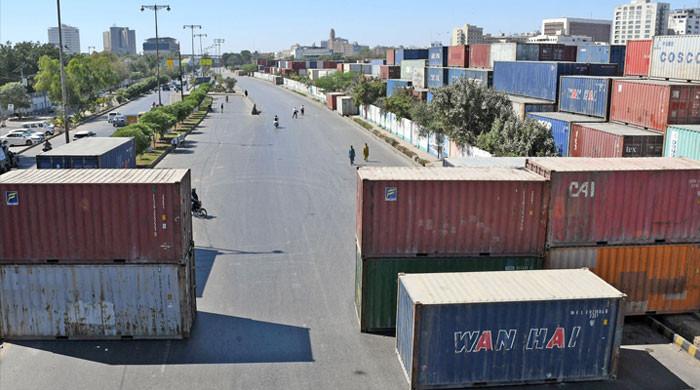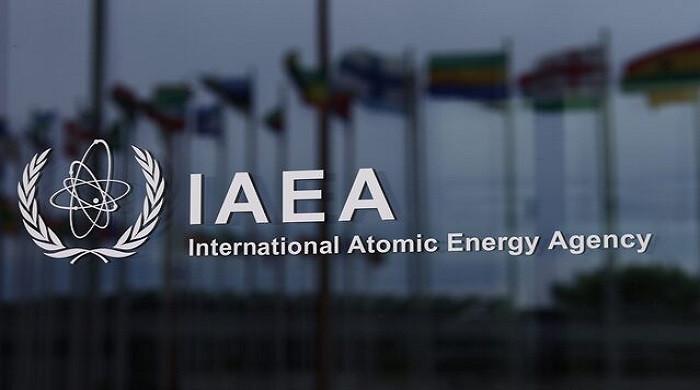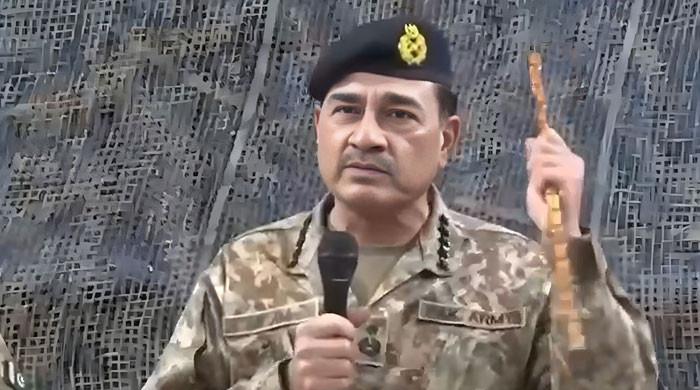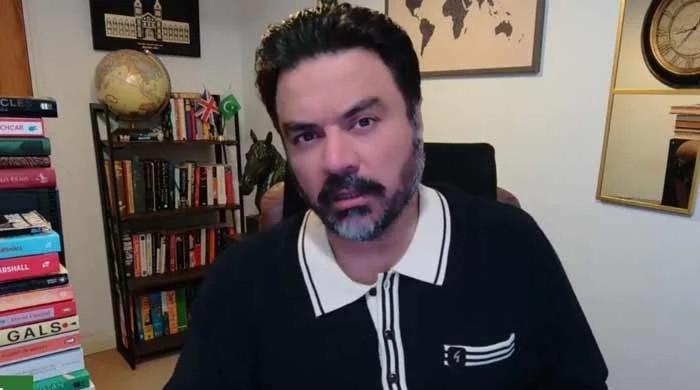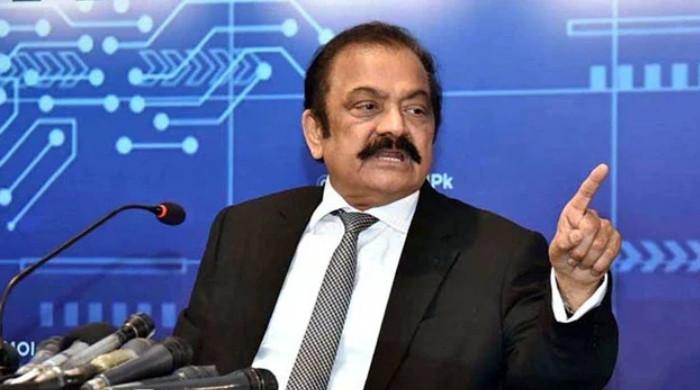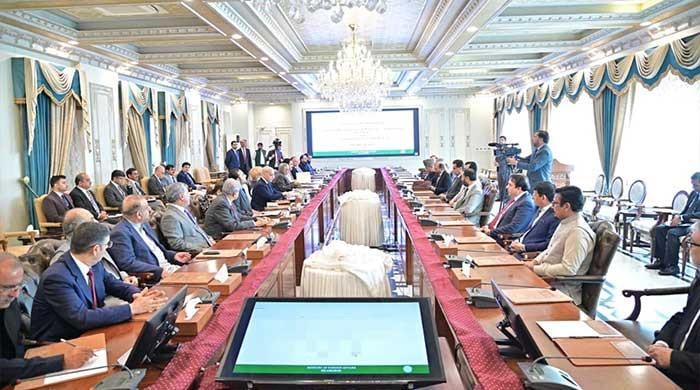National icon Dr Abdul Qadeer Khan laid to rest in Islamabad
Dr Abdul Qadeer Khan has been buried at the H-8 graveyard; funeral prayers were held at Islamabad's Faisal Mosque
October 10, 2021
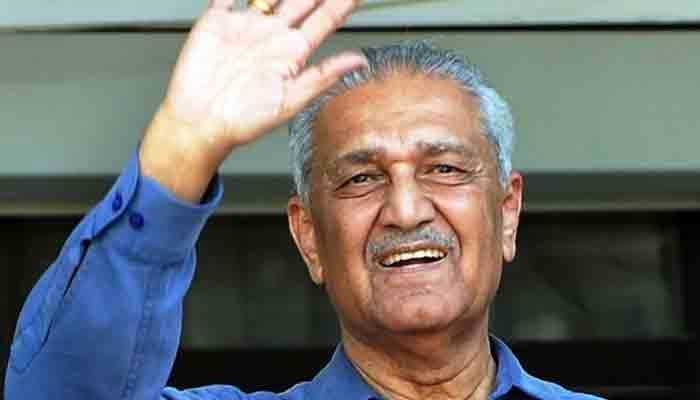
Renowned nuclear scientist and national icon Dr Abdul Qadeer Khan was laid to rest in Islamabad on Sunday.
His funeral prayers, led by Prof Dr Ahmed Al Ghazali, were held at the Faisal Mosque at 3:30pm.
A large number of people were in attendance during the funeral prayers, despite rain which began to pour shortly after 3pm.
Among those who attended the funeral were cabinet members, parliamentarians and the military leadership.
Two separate enclosures were arranged within the mosque premises, of which one expressly catered to the general public.
Khan, 85, passed away early Sunday morning after his health deteriorated.
His health started deteriorating Saturday night, after which he was brought to the KRL hospital Sunday morning in an ambulance, at 6am.
Sources said the nuclear scientist experienced discomfort in breathing after which he was brought to the hospital. However, his health took a turn for the worse when his lungs started bleeding.
Doctors tried their best to save the renowned scientist's life but were unable to do so, resulting in his death at 7:04am. Doctors have said he passed away after his lungs collapsed.
Govt announces state funeral
In recognition of his outstanding services for the country and the nation, the government announced a state funeral for Dr Abdul Qadeer Khan.
According to a notification issued by the Ministry of Interior, the national flag of Pakistan shall fly at half-mast on Sunday.
Burial
Speaking to Geo News earlier, Minister for Interior Sheikh Rasheed said that Dr AQ Khan will be buried at the H-8 graveyard, in accordance with his family's as well as his own wishes.
"We have directed the district administration to prepare a grave at the H-8 graveyard before 3pm," he said.
The minister said that previously a grave had been prepared at the Faisal Mosque premises "but now, in accordance with his will" he will be buried at the H-8 graveyard.
Prayers in absentia
Funeral prayers in absentia for the renowned scientist were held in various cities across Pakistan, including Bahawalpur, Mardan, Gujrat, Peshawar, Jhang and Hyderabad.
In Bahawalpur Jamaat-e-Islami Chief Sirajul Haq led the prayers.
In Hyderabad, MQM Pakistan held prayers in absentia. A rally scheduled to be held in the city was postponed.
'Mohsin-e-Pakistan'
Rasheed showered praise on the scientist, adding that all necessary arrangements were made to save Dr Qadeer's life.
He confirmed that the government will accord a state funeral to the scientist in recognition of his services for Pakistan.
The interior minister said Dr Abdul Qadeer Khan had helped him a lot with educational activities, adding that he had remained a visionary leader in times when Pakistan was going through a sensitive period.
"He is indeed the Mohsin-e-Pakistan," said Rasheed.
The minister later spoke at a press briefing, saying that Prime Minister Imran Khan had directed all cabinet members to attend Dr Abdul Qadeer Khan's funeral.
In response to a question, he said the funeral will be offered at the Shah Faisal Mosque, adding that the public will be allowed to attend it.
"He was a great scientist. He served his country and served it with dignity and hard work," the minister stressed. "The entire country respects him and he will be buried with honour today at 3:30pm."
He informed media that the security has been alerted for the funeral.
Dr AQ Khan is considered the father of Pakistan's nuclear programme and is revered at home as a hero for building the Muslim world's first atomic bomb.
Dr Abdul Qadeer Khan became a national hero overnight, not only in Pakistan but in the Islamic world as well, when in May 1998 Pakistan gave a befitting response to India by conducting its nuclear tests.
Following the tests, Pakistan became the sole nuclear power in the Muslim world and the seventh country to possess nuclear weapons. Pakistan's nuclear weapons have kept Indian aggression in check.
Reactions pour in over Dr Abdul Qadeer Khan's demise
Prime Minister Imran Khan praised Dr Abdul Qadeer Khan by saying that he was, for the people of Pakistan, "a national icon".
"Deeply saddened by the passing of Dr A Q Khan. He was loved by our nation because of his critical contribution in making us a nuclear weapon state. This has provided us security against an aggressive much larger nuclear neighbour. For the people of Pakistan he was a national icon," he tweeted.
President Arif Ali also expressed sadness at his death.
"Deeply saddened to learn about the passing of Dr Abdul Qadeer Khan. Had known him personally since 1982. He helped us develop nation-saving nuclear deterrence, and a grateful nation will never forget his services in this regard. May Allah Bless him," he wrote.
Foreign Minister Shah Mahmood Qureshi expressed his deep sorrow over the demise of Dr Khan. Paying rich tribute to his services for the country, FM Qureshi said that he played a pivotal role in making Pakistan’s defence impregnable.
Besides his research work, Dr Khan used to take an interest in welfare activities, he added. He proved that despite difficult circumstances, one can reach the destination one sets out for oneself, said FM Qureshi.
The foreign minister said that Dr Khan set up a team of scientists and an institution for the country.
Rasheed took to Twitter to post an old picture taken with the nuclear scientist, praying for his forgiveness.
"May Allah provide patience to Dr Abdul Qadeer Khan's relatives and those who are mourning his passing," he added.
Leader of the Opposition in the National Assembly Shahbaz Sharif praised Dr AQ Khan, saying that the country has lost a true benefactor today.
Federal Minister for Planning and Development Asad Umar prayed for Dr Abdul Qadeer Khan's soul after hearing about his demise.
He paid tribute to the nuclear scientist by saying that he played a key role in making Pakistan invincible.
Defence Minister Pervez Khattak said he was deeply grieved over the news of Dr Abdul Qadeer Khan passing, adding that "Pakistan will forever honour his services to the nation".
Education Minister Shafqat Mehmood heaped praise on the nuclear scientist, referring to him as the "pioneer of Pakistan's nuclear program".
"Sad to learn of Dr Abdul Qadeer Khan’s death. He was a pioneer of Pakistan’s nuclear program and contributed immensely to our security. May his soul RIP," he tweeted.
Federal Information Minister Fawad Chaudhry said Dr Abdul Qadeer Khan's death was a loss for the nation.
In his condolence message, Jamiat Ulema-e-Islam-Fazl (JUI-F) chief Maulana Fazlur Rehman said,” The nation has lost a great Muslim scientist and a national hero today.”
Dr Abdul Qadeer Khan made the country’s defence invincible by his skills, said Fazlur Rehman.
Other politicians and notable figures also prayed for the departed and paid tribute to the role he played in nation building.
Islamic scholar Maulana Tariq Jamil prayed for the soul of the deceased and appreciated his services for Pakistan.
"Dr Abdul Qadeer Khan was a precious asset for Pakistan," he tweeted. "He played a key role in ensuring Pakistan became a nuclear power."
Dr AQ Khan's life in a snapshot
Dr Abdul Qadeer Khan, born on April 1, 1936, in Bhopal, India, was a renowned Pakistani metallurgist and nuclear scientist.
He was among those who migrated to Pakistan in 1947 with their families.
Khan is widely regarded as the "Father of Islamic Nuclear Bomb" or founder of gas-centrifuge enrichment technology for Pakistan’s nuclear deterrent program as he developed the Muslim world's first atomic bomb.
He acquired his engineering degree from a university in the Netherlands in 1967 and later went on to secure a doctorate in metallurgical engineering from Belgium.
Dr Khan was the first Pakistani was awarded three presidential awards. He has been awarded the Nishan-e-Imtiaz (Order of Excellence) twice and the Hilal-e-Imtiaz (Crescent of Excellence) once.






